1.A tough first year in the WTO
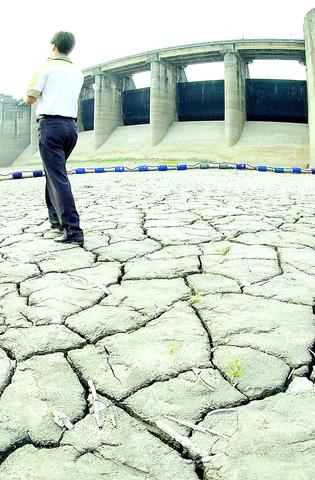
TAIPEI TIMES FILE PHOTO
Fake rice wine, agricultural discontent and strained ties with China marked Taiwan's first year in the WTO, which it joined on Jan. 1.
Senior members of the trade body also took Taiwan to task over its implementation of WTO rules, particularly with regard to the protection of intellectual property rights.
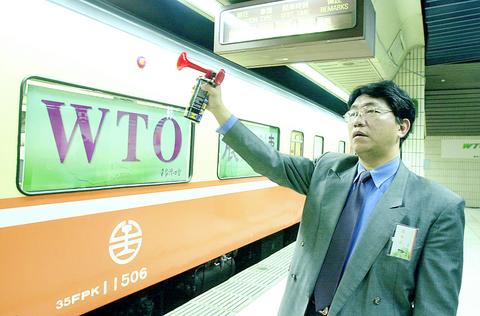
TAIPEI TIMES FILE PHOTO
Even so, trade officials from Taiwan and China eventually sat down earlier this month in Geneva to discuss Beijing's plans to slap tariffs on imports of certain steel products from Taiwan.
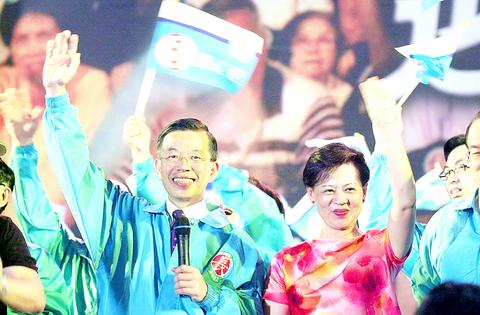
TAIPEI TIMES FILE PHOTO
The meeting marked the first time trade officials from the rival countries had negotiated under the WTO framework since they joined a year ago.
Before the groundbreaking trade talks, Chinese officials had been adamant in terming cross-strait issues as "internal affairs" and had refused to formally negotiate with Taiwan.
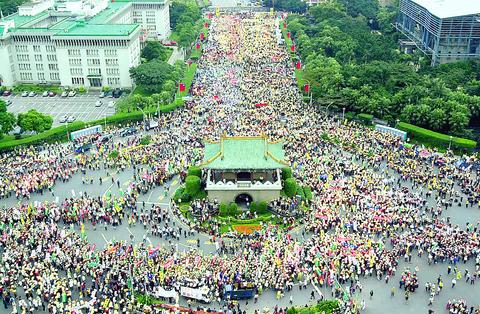
TAIPEI TIMES FILE PHOTO
While the EU and US railed against Taiwan's poor enforcement of laws preventing the pirating of music, movies and software, what alarmed Taiwanese the most was the bootlegging of rice wine.
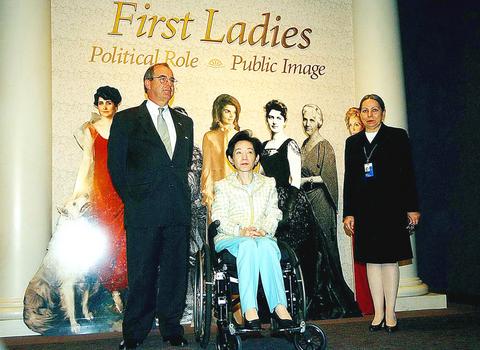
TAIPEI TIMES FILE PHOTO
The price of rice wine -- a popular cooking ingredient in Taiwanese households but viewed as "distilled liquor" in Taiwan's WTO accession agreements -- surged from NT$21 to NT$130 per bottle.
The high prices fuelled an industry making illicit rice wine that frequently contained dangerously high levels of methanol. The result was the death of 10 people in the closing weeks of the year.
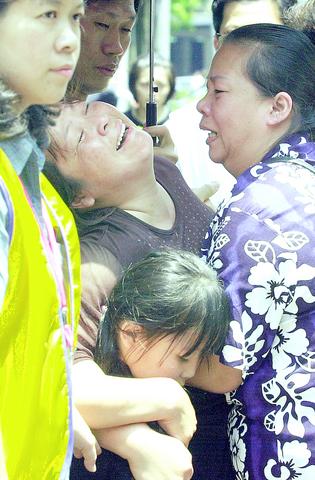
TAIPEI TIMES FILE PHOTO
The farming sector also began to feel the effects of freer markets for agricultural products.
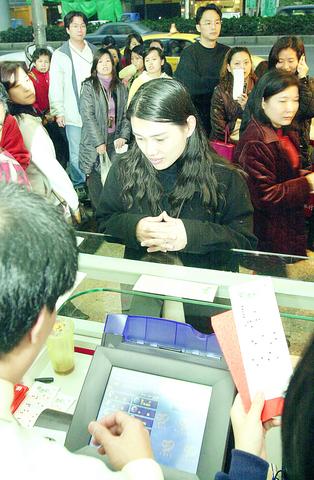
TAIPEI TIMES FILE PHOTO
The prices of more than 200 vegetables and fruits fell by between 20 percent to 50 percent during the year, further straining the finances of farmers and fishermen.
Nevertheless, Taiwan's success in joining such an influential trade body has spurred the government to begin pushing for bilateral free-trade agreements from the US and Japan. -- By Monique Chu
2.Mayoral elections confirm status quo
After weeks of strenuous campaigning and endless speculation, the results of the Dec. 7 mayoral elections for Taiwan's two biggest cities only confirmed the status quo.
In Taipei, KMT incumbent Mayor Ma Ying-jeou (馬英九) strolled to victory with 64 percent of the vote, his DPP challenger Lee Ying-yuan (李應元) mustering a mere 36 percent.
But, with a total of 1,374,862 votes cast in the Taipei poll, from a pool of 1,947,169 eligible voters, the turnout of 70.61 percent was approximately 10 percentage points lower than that in the 1998 mayoral contest.
Ma's margin of victory was 13 percentage points higher than that of 1998 and catapulted him into being a potential contender for the 2004 presidential election. Ma however, reiterated his campaign claim that he would focus on doing his job as mayor. DPP headquarters, on the other hand, noted that Lee's 36 percent of votes had safeguarded Taipei's core DPP vote.
In Kaohsiung, Taiwan's second biggest city, DPP incumbent Mayor Frank Hsieh (謝長廷) pulled off a narrow victory, taking 386,384, votes or 50 percent of the total in the five-candidate race.
His main rival, KMT candidate Huang Jun-ying (黃俊英) polled 47 percent of the votes cast, with 361,546.
The turnout in Kaohsiung was 71.38 percent.
With his wife standing alongside him and shedding tears of joy, Hsieh told his supporters that all his campaign promises would be put into action based on a strict time frame in an effort to balance development between the north of the island and the south.
The elections were billed as a mid-term exam for the struggling DPP government. In the end, all they showed -- by their relatively low turnouts -- was Taiwan's increasing weariness with party politics. -- By Sandy Huang
3.Chen's speech causes cross-strait trouble
When President Chen Shui-bian (陳水扁) uttered his "one country on either side of the Taiwan Strait" statement in August he probably had not predicted the effect it would have on cross-strait relations. Though not as controversial as former president Lee Teng-hui's (李登輝) "state-to-state" call three years earlier, the speech caused an increase in tensions between the two sides of the Strait despite general agreement that it was made without consulting members of his staff -- which was definitely not the case with Lee's controversial message.
The impacts of the two statements were also quite different. Chen's received only subdued criticism from China, while Lee's almost brought the two sides to the brink of war.
When Lee brought up the issue of "state-to-state," which demanded that any future talks between the two rivals would be held on a state-to-state basis, in July, 1999, China responded immediately with a series of military exercise.
In contrast, Chen's "one country on either side of the Taiwan Strait" statement did not provoke any military intimidation from China.
China was launching at the time a large-scale exercise off Fujian Province, but the movement was a routine series of drills held annually. China's response to Chen's statement was mainly well-controlled criticism from its state media.
Despite this, Chen still had to take action to prevent the situation from worsening -- so he sent Mainland Affairs Council Chairperson Tsai Yin-wen (蔡英文) to the US to explain the matter.
Tsai, who contributed a lot to the formation of Lee's "state-to-state" message, was counted on again to deal with another inflammatory statement.
It has yet to be seen how Chen's "one country on either side of the Taiwan Strait" statement has affected cross-strait relations, but it is clear that the statement had little impact militarily. -- Staff Writer
4.Financial reform falls through amid protest
Despite vowing to consolidate financial reforms this year, President Chen Shui-bian (陳水扁), in mid November, caved into pressure and unilaterally suspended the Ministry of Finance's (MOF) plan to reform ailing credit units of farmers' and fishermen's associations.
Calling his own administration's policies into questions, the president's move failed to mollify the agriculture community who staged a 120,000-people protest on November 23.
The policy flip-flop ended up hurting the DPP government's credibility on financial reforms.
A day before the demonstration, Premier Yu Shyi-kun submitted his resignation along with those of his two ministers' -- Finance Minister Lee Yung-san (李庸三) and chairman of the Council of Agriculture Fan Chen-tsung (范振宗) -- to shoulder political responsibilities over the fiasco.
Approving Lee's and Fan's resignations, Yu later remained in his post, putting an end to the MOF's efforts to implement a three-tier risk-control mechanism, which took effect in early September, to regulate credit units' business operations based on their non-performing loan ratio.
After kicking off its plans to improve the performance of debt-ridden credit units, the MOF had been under fire with officials at credit units arguing that the government's move was too strict and a threat to their survival.
Former President Lee Teng-hui (李登輝) also sided with the agriculture community, attacking Lee Yung-san's policies in public and warning the president of the importance of farmers' votes.
In order to map out a new plan after the policy U-turn, the Cabinet held a national conference on agriculture financing on November 30, but failed to come up with any new concrete plan. -- By Joyce Huang
5.China Airlines loses plane near Penghu
More than seven months have passed since the crash of China Airlines CI611, but families of the 225 victims have still not been compensated.
On May 25, the 22-year-old jetliner broke up in mid-air shortly after takeoff from Taipei en route to Hong Kong, scattering wreckage across a large area of the sea near the Penghu Islands.
The cause of the crash is still unknown. But investigators said recovered pieces of the aircraft show signs of metal fatigue.
The tragedy brought Taiwan and China into cooperation rarely seen in the two rivals' relationship as Chinese President Jiang Zemin (
The crash was a serious blow to the airline's already miserable safety record. China Airlines (CAL) was considered as one the world's most dangerous airlines after three fatal crashes in the late 1990s.
"As far as I know, even many CAL officials dare not take flights on the airline," said Lee Han (
Lee's complaint came at a meeting with Esther Chang (
The meeting was held after a negotiation on compensation between CAL and representatives of the victims' families broke down.
The negotiation failed because the airline abruptly changed the venue for negotiation, an act regarded by the victims' families as a sign of the airline's insincerity and its evasion of responsibility.
According to Lee, the airline never proposed further negotiations with the families after their last negotiation in July.
Although CAL proposed to offer NT$14.2 million per victim in compensation, the families refused to accept the amount and accused the airline of aborting its promised projects to improve its maintenance and repair sections.
One week after they lodged their complaint to the ministry, the victims' families requested the Control Yuan investigate whether the ministry has been negligent in its oversight of the nation's airlines.
The government owns 71 percent of CAL's shares. -- By Melody Chen
6.Drought ravages north of the country
After the devastating floods of Typhoon Nari at the end of last year, the worst drought since 1980 came as somewhat of a surprise.
The "Plum Rains" that usually deluge northern Taiwan every spring were replaced this year by week after week of dry weather.
As a result, water levels in the north's two major reservoirs, the Shihmen Dam and the Feitsui Reservoir (
The first signs of the water shortage appeared in early February, when the Cabinet announced that agricultural land in Hsinchu and Taoyuan would have to be left fallow.
The situation further deteriorated as spring went on, forcing the government to further restrict the supply of water to industrial, agricultural and domestic consumers. Water rationing was imposed in Taoyuan County, 10 townships in Taipei County and Taipei City. Water was cut off to households in these areas in rotation in June and July.
During the water rationing, water-borne diseases caused upset stomachs and diarrhea in some communities in Taipei City and Taipei County as a result of dirty water being sucked into the water system when the water was turned off and on.
The rationing also triggered conflicts between the Cabinet and the Taipei City Government, with the two arguing over the water rights of the Feitsui Reservoir, the only water resource for the Taipei area.
The Cabinet threatened to revoke the Taipei City Government's authority over the Feitsui Reservoir and accused the city government of abusing its rights. The city denied domineering the area's water resources, claiming it shared the Feitsui Reservoir with Taipei County.
The water restrictions were lifted only after Typhoon Rammasun dumped enough water to fill reservoirs at the start of July. -- By Chang Yun-Ping
7.The glitterati feed the media with scandal
There was no shortage of scandals involving the sex lives of celebrities and politicians last year and, as in previous years, they generated headlines for weeks at a time.
Among those to fall victim to the public's apparently endless appetite for titillating gossip were Cheng Chih-lung (
Cheng's wife Lu Tsu-ying (
Both Cheng and Chin denied the allegations, however. Cheng remains married to Lu and continues to serve as a PFP lawmaker. Chin retained her legislative seat.
During the summer, DPP Lawmaker Cheng Yu-chen (
Journalists were even happier when Cheng returned three months later, vowing never again to speak to the woman for whom he had earlier said he would gladly give up his legislative post.
In October, Cheng decided to break up with Wang because he said, "Wang has mental problems." He and Wang returned to Taiwan on the same day but on separate flights. It was not the end of the story, however. Wang revealed that she was pregnant with Cheng's child. She suffered a miscarriage in early December.
Cheng retained his position as a lawmaker but quit his DPP membership.
As autumn came around, a local TV personality, TVBS anchorwoman Kelly Hsueh (
Both parties denied the allegations but Hsueh resigned from her post at TVBS.
-- By Jimmy Chuang
8.First lady's US visit declared major success
Aiming to realize President Chen Shui-bian's (陳水扁) wish of visiting the US' seat of power on her husband's behalf, Taiwan's first lady Wu Shu-chen (吳淑珍) led a delegation to visit three US cities, including Washington, in September and received high praise for the goodwill trip that helped achieve some important diplomatic breakthroughs and successfully promoted the country's profile in the international community.
Wu wrapped up her 10-day visit on Sept. 29 and her remarkable performance charmed politicians in the US' and overseas Taiwanese community.
The visit to Washington, New York and Los Angeles also provided an unprecedented occasion for the public to see the quick wit and humor of the wheelchair-bound first lady.
This was the second time since President Chen Shui-bian took power that the first lady had traveled overseas to expand the country's international image on behalf of Chen, whose travel abroad is highly restricted due to pressure from China.
Over the course of 20 engagements, Wu spared no opportunity to promote Taiwan's democratic achievements, continually highlighting Taiwan's sustained effort to contribute in international society and expressing the nation's regret over its exclusion from international organizations such as the UN.
Highlights of the trip included Wu's three speeches -- at the National Arts Club in New York, the American Enterprise Institute think tank and on Capitol Hill -- and her visit to see US counterpart Laura Bush.
Owing to fatigue from the long flight, the first lady fell ill shortly after arriving in Los Angeles but she soon regained her composure after some rest and attended a banquet in the city with overseas Taiwanese.
Praising his wife's achievements, President Chen said that Wu not only successfully expanded Taiwan's international profile but also set an example for all Taiwanese women and disabled people. -- By Lin Chieh-Yu
9.Lottery madness and criminal high jinks
The TaipeiBank (
The bank, which acts as agent for the city government's lottery, said at that time that several people had cracked the bar codes on the back of the tickets, enabling them to identify winning tickets without scratching them.
The scratch-off tickets, which were first issued in January, sell for NT$100 a piece, with prizes ranging from NT$100 to as much as NT$1 million.
The incident forced TaipeiBank to recall an estimated 8.3 million tickets nationwidewand suspend the game for the rest of the month, according to the bank's vice president ,Richard Yang (
The bank's initial investigation suggested the incident had nothing to do with either the ticket printer, Pollard Banknote Ltd of Canada, or the supplier of ticket dispensers, Lottery Technology Services Corp (
Lottery Technology is a joint venture of the US' Gtech Holdings Corp, the world's largest operator of lottery systems, and Taiwan's Acer Inc.
The breach sent Gtech shares down US$2.22, or 8.5 percent, to US$23.99 on the New York Stock Exchange on Nov. 6, prompting the company to warn governments worldwide about the world's first cracking of the bar code.
The government lotteries, including scratch-off tickets and computerized tickets, were launched on Jan. 16 this year. With multi-million NT dollar jackpots and inexpensive ticket prices, lottery sales initially created a gambling frenzy across the nation.
Housewives, laborers and office workers lined up outside street-side lottery booths to buy the government-sponsored lotto, and the jackpot winners were topics of everyday chat.
While government officials said lotto sales could generate tax income for the nation, the public hysteria about the lottery has backfired, with lawmakers demanding the government reduce the number of lottery draws from two a week to one and scholars criticizing the media's saturation coverage.
Vice President Annette Lu (
-- By Kevin Chen
10.Rice-wine hikes take their toll
Taiwan's accession to the WTO in January required the nation to hike rice wine prices from NT$21 to NT$130 per 0.6-liter bottle this year.
New 2003 tax rates are expected to bring the price of the cooking staple to some NT$150 per bottle, according to Morgan Hwang (黃營杉), chairman of Taiwan Tobacco & Liquor Corp.
The huge price discrepancy forced Taiwanese to line up last Lunar New Year in February to buy their daily quota of rice wine, the supply of which failed to meet the suddenly-booming market demand.
The high prices also motivated many rice wine makers to brew bootleg products to sell at reduced prices, generating extravagant profits by evading the NT$90 tax. After hitting the market, the lethal bootleg rice wine claimed the lives of over 10 people in November, triggering a nationwide panic.
Joining forces with local governments, the Ministry of Finance cracked down on illegal brewers, busting some 653 illegal production facilities and confiscating 1.3 million liters of wine as of Dec. 27.
Meanwhile, the ministry has hammered out a proposed plan to cut rice wine prices to NT$60 per bottle in January by proposing revisions to rice wine taxes to the legislature for passage while simultaneously re-opening WTO negotiations with the US and European countries. The government's plan may not succeed since the US has vetoed Taiwan's proposal to lower distilled wine taxes.
As a solution, Taiwan Sugar Corp (Taisugar, 台糖), launched a novelty of do-it-yourself (DIY) rice-wine kit in mid December, which includes rice wine ingredients in three separate bottles. After the ministry allowed Taisugar's DIY production -- priced at NT$85 per bottle -- to hit the market, many copycats including a NT$60 Kinka Rice Spirit (

Taiwan is stepping up plans to create self-sufficient supply chains for combat drones and increase foreign orders from the US to counter China’s numerical superiority, a defense official said on Saturday. Commenting on condition of anonymity, the official said the nation’s armed forces are in agreement with US Admiral Samuel Paparo’s assessment that Taiwan’s military must be prepared to turn the nation’s waters into a “hellscape” for the Chinese People’s Liberation Army (PLA). Paparo, the commander of the US Indo-Pacific Command, reiterated the concept during a Congressional hearing in Washington on Wednesday. He first coined the term in a security conference last

Prosecutors today declined to say who was questioned regarding alleged forgery on petitions to recall Democratic Progressive Party (DPP) legislators, after Chinese-language media earlier reported that members of the Chinese Nationalist Party (KMT) Youth League were brought in for questioning. The Ministry of Justice Investigation Bureau confirmed that two people had been questioned, but did not disclose any further information about the ongoing investigation. KMT Youth League members Lee Hsiao-liang (李孝亮) and Liu Szu-yin (劉思吟) — who are leading the effort to recall DPP caucus chief executive Rosalia Wu (吳思瑤) and Legislator Wu Pei-yi (吳沛憶) — both posted on Facebook saying: “I

The Ministry of Economic Affairs has fined Taobao NT$1.2 million (US$36,912) for advertisements that exceed its approved business scope, requiring the Chinese e-commerce platform to make corrections in the first half of this year or its license may be revoked. Lawmakers have called for stricter enforcement of Chinese e-commerce platforms and measures to prevent China from laundering its goods through Taiwan in response to US President Donald Trump’s heavy tariffs on China. The Legislative Yuan’s Finance Committee met today to discuss policies to prevent China from dumping goods in Taiwan, inviting government agencies to report. Democratic Progressive Party Legislator Kuo Kuo-wen (郭國文) said

The Ministry of Economic Affairs has fined Taobao NT$1.2 million (US$36,900) for advertisements that exceeded its approved business scope and ordered the Chinese e-commerce platform to make corrections in the first half of this year or its license would be revoked. Lawmakers have called for stricter supervision of Chinese e-commerce platforms and more stringent measures to prevent China from laundering its goods through Taiwan as US President Donald Trump’s administration cracks down on origin laundering. The legislature’s Finance Committee yesterday met to discuss policies to prevent China from dumping goods in Taiwan, inviting government agencies to report on the matter. Democratic Progressive Party